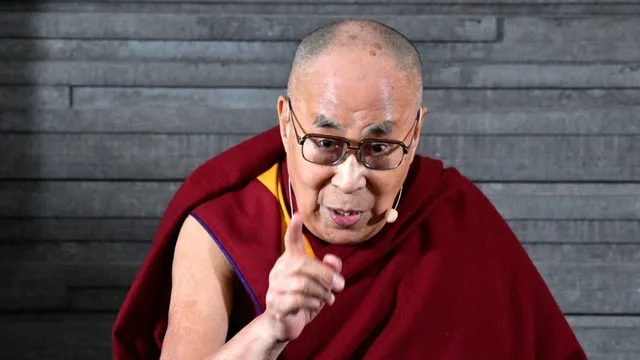- By Supratik Das
- Mon, 30 Jun 2025 02:17 PM (IST)
- Source:JND
The 14th Dalai Lama will this week is expected to outline a crucial succession plan this week as he speaks to a significant three-day conclave of high-level Buddhist religious leaders before reaching his 90th birthday, in a gesture that has the potential to revive tensions with China over how Tibet's future spiritual leader is to be selected. Beijing considers the Dalai Lama, who escaped Tibet in 1959 after a rebellion against Chinese Communist rule failed, a threat of separatism, and maintains that it alone will appoint his successor. The Dalai Lama has indicated, however, that Beijing can forget about any chosen successor of his being accepted by his followers. He has consistently stated his reincarnation will occur outside China to protect Tibet's religious tradition from Chinese political influence.
In Tibetan Buddhist belief, enlightened monks are reborn to carry on their spiritual lineage. The Dalai Lama, who is alive today, Lhamo Dhondup, born on July 6, 1935, to a peasant family in what is now China's Qinghai province, was recognized at age two as the reincarnation of the 13th Dalai Lama. A traditional search event, which was led by visions and indications shown to elder monks, found the young boy after he identified objects that belonged to his predecessor by uttering the words "It's mine, it's mine." In 1940, he was escorted to the legendary Potala Palace in Lhasa and formally enthroned as the 14th Dalai Lama, the spiritual leader of Tibetans.
Dalai Lama: Successor Will Be Born Outside China
In his new book Voice for the Voiceless, published in March 2025, the Dalai Lama again asserted that his future reincarnation will not be born inside China. He has been in exile in India's northern Himalayan town of Dharamshala since 1959 and has indicated that he might reincarnate in India. Speaking to a huge crowd of his followers this Monday while they prayed for his long life, the Dalai Lama has stated, “The rest of my life I will dedicate to the benefit of others, as much as possible, as extensively as possible. There will be some kind of a framework within which we can talk about the continuation of the institution of the Dalai Lamas.” Though he did not elaborate on this framework, Tibetan officials in exile say there is already a clear system in place. The Tibetan parliament-in-exile has confirmed that the Dalai Lama’s Gaden Phodrang Foundation, established in 2015, will be responsible for searching and recognising the next Dalai Lama. The foundation’s senior officers include several of his closest aides.
China, though, insists it has the right to sanction the Dalai Lama's reincarnation, invoking a Qing dynasty tradition in 1793, which states that candidates for reincarnated lamas have to be selected by lot from a golden urn. Chinese authorities have insisted again and again that any reincarnation has to be born within the boundaries of China and sanctioned under its laws. Most Tibetans believe this is a political move to undermine the genuine spiritual lineage. The Dalai Lama has requested in his speeches and writings that Tibetans "reject any candidate selected for political purposes by anyone, including members of the People's Republic of China." He has also accused the irony of China's officially atheist Communist Party meddling with a religious practice it does not believe in.
India, US Interest in Dalai Lama's Succession
With more than 100,000 Tibetan Buddhists living openly in India, the Dalai Lama's presence in Dharamshala provides New Delhi with gentle leverage in its frequently strained relations with Beijing. India's Parliamentary Affairs Minister Kiren Rijiju and other Indian representatives are likely to attend the prayer and birthday ceremonies on July 5 and 6. Hollywood star Richard Gere, a long-time advocate for the Tibetan cause, will also attend the assembly, the first major religious gathering since 2019. The United States, for its part, has also constantly asserted that it would not accept any Dalai Lama successor selected under Chinese rule. In 2024, former US President Joe Biden signed a bill pushing Beijing to end the longstanding conflict over Tibet's call for greater autonomy and to allow Tibetans the liberty to select their spiritual leader without Chinese interference.
ALSO READ: Indian Woman Goes Missing In US After Arranged Marriage Plan; Probe Underway
As the Dalai Lama gets set to celebrate his 90th birthday with prayers, festivities, and a long-awaited speech, everyone's attention is now focused on how his intended succession plan will play out, and how China, India, and the international Tibetan diaspora will react in the years ahead.

